Ferrum Technology Services Blog
Ferrum Technology Services will be performing maintenance on our support portal. This maintenance may affect access to our various client facing support tools - portal.ferrumit.com and support.mysupport247.net.
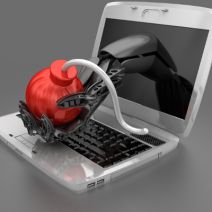 Today’s various versions of ransomware are dangerous. By forcibly locking down important files on a victim’s computer, threats like CryptoLocker and CryptoWall are posing significant threats to both businesses and ordinary computer users. However, a new type of ransomware has appeared called CryptoJoker; and we assure you, there’s nothing funny at all about this one.
Today’s various versions of ransomware are dangerous. By forcibly locking down important files on a victim’s computer, threats like CryptoLocker and CryptoWall are posing significant threats to both businesses and ordinary computer users. However, a new type of ransomware has appeared called CryptoJoker; and we assure you, there’s nothing funny at all about this one.
 Every business wants to be equipped with the latest and greatest IT equipment and software. Yet, due to realities like budget shortcomings, time constraints, and the lack of knowledge about IT trends, it can be difficult for the average SMB to attain that dream technological setup on their own. However, by being smart about how you approach IT, your company can still have a network that exceeds your expectations.
Every business wants to be equipped with the latest and greatest IT equipment and software. Yet, due to realities like budget shortcomings, time constraints, and the lack of knowledge about IT trends, it can be difficult for the average SMB to attain that dream technological setup on their own. However, by being smart about how you approach IT, your company can still have a network that exceeds your expectations.
 Businesses that have online dealings should always be aware of how much danger their operations are in, especially with the omnipresent threat of hackers. Depending on the severity of the hacking attack, some organizations might not even know they’ve been hacked until it’s far too late. It’s critical that your business is able to identify potential threats before they’ve caused irreparable damage to your infrastructure.
Businesses that have online dealings should always be aware of how much danger their operations are in, especially with the omnipresent threat of hackers. Depending on the severity of the hacking attack, some organizations might not even know they’ve been hacked until it’s far too late. It’s critical that your business is able to identify potential threats before they’ve caused irreparable damage to your infrastructure.
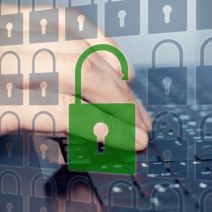 In 2015, there was an incredible amount of information stolen from organizations all over the world. From healthcare companies to government institutions, nobody was safe from the endless onslaught of hacking attacks. Now, in the wake of these hackers’ destruction, it seems that most of the incidents in question exposed passwords and email address; important credentials that put many users’ security in jeopardy.
In 2015, there was an incredible amount of information stolen from organizations all over the world. From healthcare companies to government institutions, nobody was safe from the endless onslaught of hacking attacks. Now, in the wake of these hackers’ destruction, it seems that most of the incidents in question exposed passwords and email address; important credentials that put many users’ security in jeopardy.
 Businesses utilize a ton of data in order to keep operations running smoothly, but what happens to data that’s unused? Are they files that are potentially sensitive in nature? If your dark data isn’t being stored securely, it could be at risk of data compromisation, or worse. Therefore, it becomes critical to address your business’s dark data issue before it becomes an even bigger problem.
Businesses utilize a ton of data in order to keep operations running smoothly, but what happens to data that’s unused? Are they files that are potentially sensitive in nature? If your dark data isn’t being stored securely, it could be at risk of data compromisation, or worse. Therefore, it becomes critical to address your business’s dark data issue before it becomes an even bigger problem.
 Cyber security continues to be a major pain point for small and medium-sized businesses, even if they’re taking the fight to the latest threats with solutions like antivirus and firewalls. Significant progress has been made, yet new threats are born every day. In fact, you might be surprised to find out that a monstrous 27.3 percent of all malware in the world was created just last year.
Cyber security continues to be a major pain point for small and medium-sized businesses, even if they’re taking the fight to the latest threats with solutions like antivirus and firewalls. Significant progress has been made, yet new threats are born every day. In fact, you might be surprised to find out that a monstrous 27.3 percent of all malware in the world was created just last year.
 Technology has changed the world. It has changed individual lives, businesses, and the way people communicate with one another. The main reason for this is that technology, and the use of it, happens everywhere. In fact, the world has seen a huge spike in the addition of microprocessors to ordinary objects which allows them to communicate with the digital world. This trend is known as ubiquitous computing.
Technology has changed the world. It has changed individual lives, businesses, and the way people communicate with one another. The main reason for this is that technology, and the use of it, happens everywhere. In fact, the world has seen a huge spike in the addition of microprocessors to ordinary objects which allows them to communicate with the digital world. This trend is known as ubiquitous computing.
 Have you ever spent time writing an email to somebody that you haven’t emailed before, hit send, and then wondered if the email address is even valid? For the active email user, this is an all-too-common scenario. How can you know for sure if an email address is valid before sinking time into writing a message?
Have you ever spent time writing an email to somebody that you haven’t emailed before, hit send, and then wondered if the email address is even valid? For the active email user, this is an all-too-common scenario. How can you know for sure if an email address is valid before sinking time into writing a message?
 The number of high-profile hacks that have occurred over the past several years continues to climb, and it won’t let up anytime soon. Now, another incident involving Time Warner Cable, a large ISP in the United States, shows that even large companies that deal with sensitive information aren’t invincible from data breaches.
The number of high-profile hacks that have occurred over the past several years continues to climb, and it won’t let up anytime soon. Now, another incident involving Time Warner Cable, a large ISP in the United States, shows that even large companies that deal with sensitive information aren’t invincible from data breaches.
 Businesses are trying to cut costs wherever possible, but the cost of printing isn’t always the most obvious first choice. Businesses consume exorbitant amounts of paper and ink every year, and these resources cost a significant amount of money that could be better spent elsewhere. Thankfully, there are a ton of great solutions that can virtually eliminate the costs of unnecessary printing.
Businesses are trying to cut costs wherever possible, but the cost of printing isn’t always the most obvious first choice. Businesses consume exorbitant amounts of paper and ink every year, and these resources cost a significant amount of money that could be better spent elsewhere. Thankfully, there are a ton of great solutions that can virtually eliminate the costs of unnecessary printing.
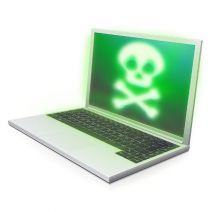 Have you ever been the target of an email spoofer? This can be a difficult question to answer, especially if you don’t know what you’re looking for. Email spoofing can appear to be from legitimate sources, but the most important indicator is if the message looks like spam or fishy in general. If you ever receive a message like this, you might wonder why your spam filter didn’t catch such an obvious trap.
Have you ever been the target of an email spoofer? This can be a difficult question to answer, especially if you don’t know what you’re looking for. Email spoofing can appear to be from legitimate sources, but the most important indicator is if the message looks like spam or fishy in general. If you ever receive a message like this, you might wonder why your spam filter didn’t catch such an obvious trap.
 If you’re still using Windows 8 (instead of the much improved 8.1), we’ve got bad news for you. Microsoft has ceased offering patches and security updates for the Windows 8 operating system, which means that if you want to be using the most secure and up-to-date operating system, you should make the switch to Windows 8.1 or Windows 10.
If you’re still using Windows 8 (instead of the much improved 8.1), we’ve got bad news for you. Microsoft has ceased offering patches and security updates for the Windows 8 operating system, which means that if you want to be using the most secure and up-to-date operating system, you should make the switch to Windows 8.1 or Windows 10.
 In 2015, we saw countless hacking attacks against major corporations, from health insurance providers like Blue Cross Blue Shield and Anthem, to government offices, like the United States Office of Personnel. Due to the stigma associated with hacking, we often forget that there are a lot of hackers out there who try to use their skills for good--or, at least, less awful purposes.
In 2015, we saw countless hacking attacks against major corporations, from health insurance providers like Blue Cross Blue Shield and Anthem, to government offices, like the United States Office of Personnel. Due to the stigma associated with hacking, we often forget that there are a lot of hackers out there who try to use their skills for good--or, at least, less awful purposes.
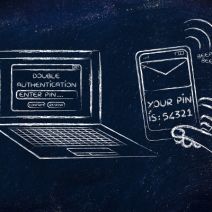 More often than not, it’s always recommended that you use a solid password to optimize your online accounts. However, just because passwords are critical, doesn’t mean that you should put all your eggs in one basket. Passwords should only be the start of a comprehensive online account security setup.
More often than not, it’s always recommended that you use a solid password to optimize your online accounts. However, just because passwords are critical, doesn’t mean that you should put all your eggs in one basket. Passwords should only be the start of a comprehensive online account security setup.
 With so many great mobile devices at your team’s disposal, it’d be a shame to not allow them to use their devices in the workplace. This trend, known as Bring Your Own Device (BYOD), has been taking the workplace by storm, and offers a great way to enhance productivity both in and out of the office. BYOD, while a great asset, should only be approached with caution, as the slightest oversight could expose sensitive information to the world.
With so many great mobile devices at your team’s disposal, it’d be a shame to not allow them to use their devices in the workplace. This trend, known as Bring Your Own Device (BYOD), has been taking the workplace by storm, and offers a great way to enhance productivity both in and out of the office. BYOD, while a great asset, should only be approached with caution, as the slightest oversight could expose sensitive information to the world.
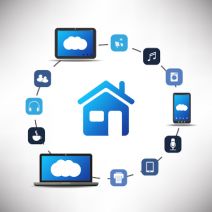 The Internet of Things is a trend that has been a long-time coming. Some of the devices it brings are great for productivity and efficiency, but others are still relatively useless. Regardless, it’s estimated by the IDC that global Internet of Things (IoT) spending will exceed $1.3 trillion by 2020. With such a large amount of capital being invested in IoT devices, your organization will need to know all there is to know about the Internet of Things.
The Internet of Things is a trend that has been a long-time coming. Some of the devices it brings are great for productivity and efficiency, but others are still relatively useless. Regardless, it’s estimated by the IDC that global Internet of Things (IoT) spending will exceed $1.3 trillion by 2020. With such a large amount of capital being invested in IoT devices, your organization will need to know all there is to know about the Internet of Things.
 A clean computer is one that you can rely on. Like all other kinds of technology, a computer needs regular maintenance and cleanup sessions that preserve its working ability and prolong its life. Since January is Clean Up Your Computer Month, there’s no time like the present to ensure that your PC is squeaky clean. Here’s how you can give your computer and its components a comprehensive cleaning.
A clean computer is one that you can rely on. Like all other kinds of technology, a computer needs regular maintenance and cleanup sessions that preserve its working ability and prolong its life. Since January is Clean Up Your Computer Month, there’s no time like the present to ensure that your PC is squeaky clean. Here’s how you can give your computer and its components a comprehensive cleaning.
 Bitcoin, a cryptocurrency used for anonymity on the web, was once the hottest thing on the cyber market. Everyone thought it was a great innovation that allowed for improved online privacy for transactions. Thanks to some rather complicated matters, though, Bitcoin took a nosedive and has needed some time to get back on its feet. Now, it seems people are finally using Bitcoin again, and in a never before seen quantity.
Bitcoin, a cryptocurrency used for anonymity on the web, was once the hottest thing on the cyber market. Everyone thought it was a great innovation that allowed for improved online privacy for transactions. Thanks to some rather complicated matters, though, Bitcoin took a nosedive and has needed some time to get back on its feet. Now, it seems people are finally using Bitcoin again, and in a never before seen quantity.

